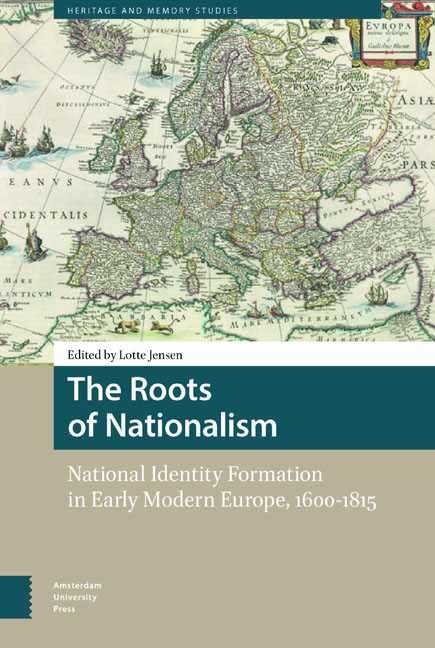Book contents
- Frontmatter
- Contents
- The Roots of Nationalism: Introduction
- Part One The Modernist Paradigm Contested
- Part Two The Genealogy of National Identity
- Part Three Negative Mirror Imaging
- Part Four Maps, Language and Canonisation
- Part Five Nation in the Age of Revolution
- List of Illustrations
- List of Contributors
- Index
9 - Defining the Nation, Defending the Nation: the Spanish Apologetic Discourse during the Twelve Years’ Truce (1609-1621)
Published online by Cambridge University Press: 03 February 2021
- Frontmatter
- Contents
- The Roots of Nationalism: Introduction
- Part One The Modernist Paradigm Contested
- Part Two The Genealogy of National Identity
- Part Three Negative Mirror Imaging
- Part Four Maps, Language and Canonisation
- Part Five Nation in the Age of Revolution
- List of Illustrations
- List of Contributors
- Index
Summary
Spain is maybe one of the most troubled European nations when it comes to the definition of its national identity. Although most scholars nowadays do not deny that the proto-national roots of Spain are to be found in the early modern period, it has been problematic to accept this perennial concept of Spain within contemporary Spanish historiographical discourse. After the end of the Franco regime, with its famous motto ‘España, una, grande y libre’, historians focused their research on the roots of all peripheric nations within Spain, from the nineteenth century and before, but not of ‘Spain’ as a whole. The eminent English historian Sir John Elliott warned in 2001 about the threatening fragmentation of the history of Spain, should everybody in the country continue to concentrate only on particular ‘regional’ / ‘national’ histories. Although in the literary field the great critic José Antonio Maravall had already argued decades earlier that a proto-national notion of Spain was distinctly present in Golden Age Spanish theatre, the field of history remained dominated by the modernist vision of nationalism for a long time. Recent books like Ser españoles. Imaginarios Nacionalistas en el siglo XX, although focusing on the twentieth century, reveal that the tide has changed and that talking about ‘Spanish nationalism’ does not imply being a right-wing, chauvinist zealot. In my own research about Spanish perceptions of the Dutch Revolt and the ensuing Eighty Years’ War in the early modern period, I concluded that the hetero-images of the Dutch enemy were clearly intertwined with the construction of a clear and well-defined Spanish national identity. The Spaniards in the Spanish sources, both historical and literary, were frequently addressed and bundled together as ‘we’ (nosotros), and Spain was ‘nuestra España’ or ‘nuestra nación’ (our Spain, our nation). Moreover, those ‘españoles’ embodied ancient virtues, such as insurmountable bellicosity, loyalty to their kings and devout religiosity, amongst other qualities. These positive qualities distinguished them from other peoples and from their enemies. In recent years, Hispanists and also literary historians in general have expressed a growing interest in tracing the emergence of a Spanish ‘nation’ through constructions of community in literary works.
- Type
- Chapter
- Information
- The Roots of NationalismNational Identity Formation in Early Modern Europe, 1600–1815, pp. 185 - 198Publisher: Amsterdam University PressPrint publication year: 2016
- 1
- Cited by



